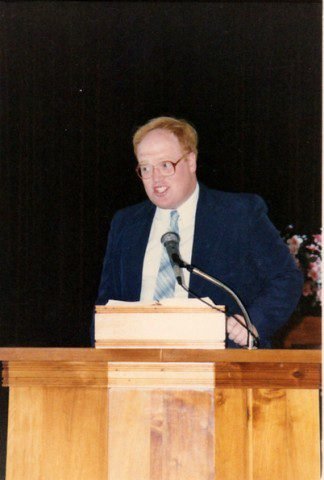
Recently, Jeff asked a question about something I wrote. He asked me to explain this statement:
I spent the remainder of my time in the ministry trying to get saved people unsaved. This proved much harder than getting them saved. Embracing Calvinism in the mid- to late- 1980s forced me to reorient my approach to preaching and evangelism.
Jeff spent thirty years in the Independent Fundamentalist Baptist (IFB) church movement. Hopefully, I can adequately answer his question.
When I entered the ministry in 1976, I preached the IFB gospel of one-two-three-repeat-after-me salvation, also known as easy-believism or decisional regeneration.
Bob Gray, Sr., retired pastor of the Longview Baptist Temple (now Emmanuel Baptist Church) in Longview, Texas, is a super-duper salvation-dealing machine. Gray is an Independent Fundamentalist Baptist (IFB) who religiously subscribes to the Jack Hyles Easy-Believism, cheap-grace way of evangelizing lost sinners.
I was taught this kind of evangelism while a student at Midwestern Baptist College, but I came to see that it was little more than a cheap gimmick that allows preachers such as Gray to say: Look at how many people I won to Jesus. (Gray knows to the soul how many people he has won to Jesus over his long, illustrious preaching career.) It promotes a vacuous Christianity that does a real disservice to people who take the commands and teachings of Christ seriously.
Several years ago, Gray was in Albuquerque, New Mexico to hold a preaching meeting. While at a local Subway, Gray decided to do some soul winning. Here’s his account, which has since been pulled from his blog:
… Flew to Albuquerque, NM, and was picked up by Pastor Brent Lenetine who pastors the Gospel Light Baptist Church of Rio Rancho, NM. I will be joined by Evangelist Allen Domelee Sunday night and Monday. This is a great soul winning church!
After resting for a while I went next door to the Motel to get a bite to eat at the Subway Restaurant. I sat at a table next to a man named Bill McDermit. We joked a little bit together and after a while I went over to his table and continued our conversation. He lives alone in a house trailer and was a devout Catholic. After a few moments I presented the Gospel to him and he took me by the hand and prayed to receive Christ as his personal Saviour.
WOW! That old KJB is still preserved inspiration and is THE incorruptible seed that brings life to a dead soul! Don’t treat this issue of preserved inspiration lightly. He who sticks his head in the sand gets his behind kicked! Either the KJB is inspired or it is not! Which side of this issue are you on?
Let me summarize Gray’s testimony:
Gray is on the prowl for souls in Albuquerque.
Gray is hungry, so he goes to Subway to eat.
He jokes around with the elderly trailer-living Catholic man next to him. The joking is a pretext for what comes next.
After a few moments, Gray shares the Jack Hyles IFB plan of salvation with the Catholic man.
The life-long Catholic sees the error of his way, takes Gray’s hand, and prays the sinner’s prayer. Holding the hand is important, much like the salesman giving you the pen. Hold their hand and you are more likely to close the salvation deal.
In but a few moments this man goes from a headed-for-hell Catholic to a . . . uh . . . let me think . . . oh, I know! A Catholic who prayed a prayer so the busybody preacher would let him finish his sub.
And don’t forget that Gray used the all-powerful 1611 King James Bible to win this man to Jesus. It has supernatural powers that perverted, Satanic, non-inspired versions do not have.
This is the bankrupt gospel preached in countless IFB churches.
IFB preachers love to brag about how many souls are saved in their churches or revival meetings. Every soul saved is another notch on their gospel six-shooters. However, what happens to these sinners after they are saved? Do they get baptized? Do they join the church? Do they regularly attend church? Do they live their lives according to the teachings of the Bible? In most instances, no. IFB churches retain a fraction of the people whom they report making salvation decisions. A pastor may humble-brag about 300 people getting saved, yet when asked if his church’s attendance correspondingly increased, he will likely say no. It seems, then, there’s a huge disconnect between the methodology used and the fruit it bears.
In July 1983, I started Somerset Baptist Church, a new congregation in the southeast Ohio community of Somerset. The church later moved five miles east of Somerset to an abandoned Methodist church building. From 1983-1988, six hundred people were saved under my ministry. During this time, the church reached a high attendance of 206. Every week, sinners were being saved, but most of them never became active members of the church.
The disconnect between these two things began to trouble me. After reading John MacArthur’s seminal book, The Gospel According to Jesus, I concluded that I was preaching a truncated, bankrupt gospel; that I was making people seven-fold children of Hell. I realized that many church members had a superficial understanding the Christian gospel and God’s expectations for the followers of Jesus.
In 1989, I repudiated the IFB gospel and embraced Evangelical Calvinism. I began preaching expositionally. I spent two years preaching through the Gospel of John — 125 sermons in all. One of my goals was to show church members the true gospel of Sovereign Grace, and ask them to examine their lives and determine whether they were “in the faith.” This thinking transformed every aspect of my preaching and ministry. I stopped giving high-pressure altar calls, choosing to let the Holy Spirit do his perfect work. Very few people made public professions of faith post-1989. In fact, for the next decade, the number of souls saved was minimal, less than twenty. I was content to focus on my preaching and let God do the saving.
I believed then, and still do, that this approach results in better quality converts; people who understand the gospel and know what God expects of them. Saying you are a Christian should mean something. At the very least, it should mean that you take the teachings of the Bible seriously and daily work to put them into practice in your life. One need only look at modern Evangelicalism to see that churches are largely filled with cultural Christians. Oh, they believe, but when it comes to living according to the teachings of Christ, they give little more than lip service to his demands. How else do we explain that 82% of white Evangelicals voted for Donald Trump, and if given a chance to do so in 2024, they will do so again. There’s no possible way a Christian can vote for Trump and stay true to the teachings of the Bible. And then there are the daily sex scandals in Evangelical churches, as documented in the Black Collar Crime Series. It’s hard not to look at Evangelicalism as a whole and puke. I suspect Jesus, were he still alive, would do the same.
I may be an atheist, but I still believe that if people claim to be Christian, they should take their faith and the teachings of the Bible seriously.
Bruce Gerencser, 66, lives in rural Northwest Ohio with his wife of 45 years. He and his wife have six grown children and thirteen grandchildren. Bruce pastored Evangelical churches for twenty-five years in Ohio, Texas, and Michigan. Bruce left the ministry in 2005, and in 2008 he left Christianity. Bruce is now a humanist and an atheist.
Connect with me on social media:
Your comments are welcome and appreciated. All first-time comments are moderated. Please read the commenting rules before commenting.
You can email Bruce via the Contact Form.

